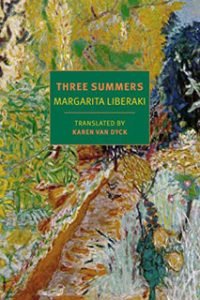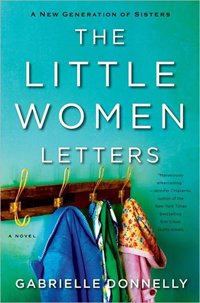Three Summers by Margarita Liberaki | Book Review
 Three Summers (originally The Straw Hats) by Margarita Liberaki, Translation by Karen Van Dyck
Three Summers (originally The Straw Hats) by Margarita Liberaki, Translation by Karen Van Dyck Genres: Fiction, Greek Literature
Original Publication Date: Originally published in Greece in 1946 as The Straw Hats
Source: I purchased this book
Goodreads

Three Summers is the story of three sisters growing up in the countryside near Athens before the Second World War. Living in a big old house surrounded by a beautiful garden are Maria, the oldest sister, as sexually bold as she is eager to settle down and have a family of her own; beautiful but distant Infanta; and dreamy and rebellious Katerina, through whose eyes the story is mostly observed. Karen Van Dyck’s translation captures all the light and warmth of this modern Greek classic.
Table of Contents
Three Summers In The Life Of A Greek Family
This book takes place over three summers in the lives of a Greek family.
There are three sisters. Maria is the oldest, she is about 20. Infanta is the middle sister, and Katarina is the youngest.
The other characters in the family are their mother, grandfather, and Aunt Theresa. Their mother is divorced from their father and he appears briefly in the book.
Straw Hats
The original title was The Straw Hats. This book is possibly the most famous modern novel in Greece, with many Greek readers saying it is their favorite book of all time.
The book begins with the first summer. Katarina, the youngest of the sisters, is the narrator at the beginning of the book:
That summer we bought big straw hats. Maria’s had cherries around the rim, Infanta’s had forget-me-nots, and mine had poppies as red as fire.
The book goes on to unveil family secrets and how the various family members resolve their issues. The main family issue was that their Polish grandmother left their grandfather years earlier for another man. They have no idea what happened to her.
Family Secrets
The aunt was sexually assaulted by a boyfriend years ago and has been traumatized for life.
She doesn’t like or trust men much and is very influential on Infanta. Infanta is virginal and seems to enjoy riding her horse more than anything else.
The three summers include the various romantic and sexual entanglements of all three sisters.
Analysis
I have to admit that I struggled with this novel. There appear to be shifting narrators.
Most of the book is narrated by Katarina, but other sections are narrated by other characters but it is sometimes not made clear who is doing the narrating in different sections.
I don’t have a problem with different narrators – for example, I enjoyed Cassandra at the Wedding.
In that book, the first section is narrated by Cassandra, the second section by her sister Judith, and the third section is narrated by Cassandra again.
But that book makes it VERY CLEAR who is narrating. Three Summers does not do that and I found it confusing.
I understood it better after reading about this at NPR:
Youngest sister Katerina narrates from her first person child’s perspective, with occasional departures to give voice to her sisters’ interior lives. Katerina’s narration generates the book’s dreaminess; she’s an imaginative storyteller with “a tendency to make things up … and then later to think they’re true.”
I really wanted to like the book more. To be honest, I didn’t really care for the characters that much. The two younger sisters didn’t seem to do much of anything, just walk around the village and think about men. Maria at least gets married and pregnant and embraces motherhood.
The characters in the book seem to be completely unaffected by what was going on in the world at that time.
According to The Paris Review article written by the translator of the book:
The world inside the book could not be more unlike the world the book came into when it was first published in 1946, immediately after the terrible famine and the Axis occupation of Greece during World War II, and on the brink of the even more devastating civil war, barely a shadow of which can be found in the idyllic world between its covers.
Further Reading and Viewing
Here are some interesting articles about this book:
Three Sisters, Three Summers in the Greek Countryside by The Paris Review.
3 Sisters Come Of Age, Dreamily, In ‘Three Summers’ by NPR.
Book of the Month: ‘Three Summers’ by Margarita Liberaki by Greek News Agenda.
And some reviews from BookTube:
Shawn Breathes Books discusses this novel with other BookTuber friends:
Here is a review of the book by SherdsTube. He read several Greek novels while living in the lovely Greek countryside. His review of Three Summers begins around 15:20.
Please read some of my other reviews:
Chocolates For Breakfast by Pamela Moore | Book Review
The Summer Book by Tove Jansson.
The Greengage Summer by Rumer Godden.
Summer at Tiffany by Marjorie Hart.
Don’t Let’s Go to the Dogs Tonight by Alexandra Fuller.
Books On My Fall 2023 Reading List
and check out my other blog :
Thank you for reading The Literary Lioness!





